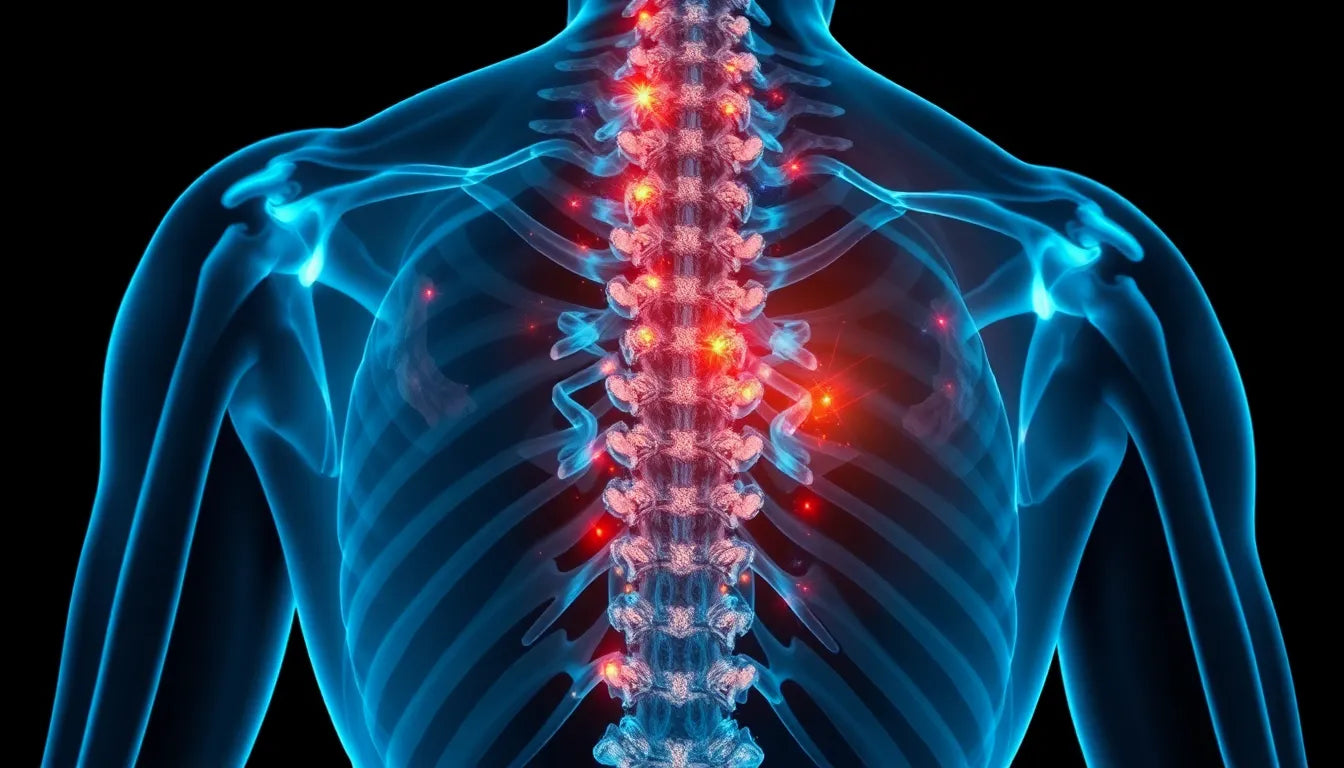Workplace injuries are an unfortunate reality for many employees, with herniated discs being one of the most prevalent yet misunderstood conditions. These injuries can occur in various job settings, from physically demanding roles to those that require prolonged periods of sitting. Despite their frequency, herniated disc injuries often leave workers grappling with pain and uncertainty about their rights and potential compensation.
The impact of herniated disc injuries
A herniated disc injury can significantly disrupt an individual's life, leading to chronic pain, reduced mobility, and long-term health complications. The spine's discs act as cushions between the vertebrae, and when one of these discs becomes herniated, it can press on the surrounding nerves, causing symptoms such as back pain, numbness, and weakness. These symptoms not only affect the ability to perform work-related tasks but can also diminish the quality of life outside of work.
Understanding the implications of a herniated disc injury is crucial for workers. It helps in navigating the often complex landscape of workers' compensation claims. Knowing your rights and the benefits you are entitled to can make a significant difference in your recovery and financial stability.
Setting the stage for compensation
This blog post aims to serve as a comprehensive guide for those dealing with herniated disc work injuries. We will explore the intricacies of workers' compensation, from understanding the nature of these injuries to the steps necessary for filing a claim. By shedding light on the process, we hope to empower workers to secure the compensation they deserve, ensuring they receive the appropriate medical care and financial support during their recovery journey.
Stay tuned as we delve deeper into the specifics of herniated disc injuries, the common causes in the workplace, and the various benefits available through workers' compensation. Our goal is to provide you with the knowledge and tools needed to navigate this challenging situation effectively.
Understanding herniated disc injuries
A herniated disc, often referred to as a slipped or ruptured disc, occurs when the soft center of a spinal disc pushes through a crack in the tougher exterior casing. This can lead to nerve irritation or compression, resulting in symptoms such as persistent back pain, numbness, tingling, and muscle weakness. These symptoms can vary significantly, depending on the location of the herniated disc and the severity of the nerve compression.
Herniated disc injuries are typically classified into three levels based on severity:
- Low-level injuries: These involve minor pain and discomfort, often managed with physical therapy and over-the-counter pain relievers. Workers with low-level injuries can usually continue working, albeit with some restrictions.
- Moderate-level injuries: These require more intensive treatment, such as the use of support braces and regular medical attention. Workers may need to take time off work to focus on recovery.
- Critical-level injuries: In severe cases, surgical intervention may be necessary to alleviate symptoms and prevent further complications. Recovery from surgery can be lengthy, often requiring extended periods away from work.
Common causes of herniated discs in the workplace
Workplace environments can be a breeding ground for herniated disc injuries, particularly in jobs that involve physical labor or repetitive movements. Some common causes include:
- Slips, trips, and falls: Sudden impacts or awkward landings can place excessive stress on the spine, leading to disc herniation.
- Collisions with objects: Accidents involving heavy machinery or equipment can cause significant spinal injuries.
- Repetitive movements: Tasks that require frequent bending, twisting, or lifting can gradually wear down spinal discs, increasing the risk of herniation.
Workers' compensation for herniated disc injuries
Understanding the workers' compensation landscape is crucial for those dealing with herniated disc injuries. Compensation can provide essential financial support during recovery, covering various costs related to the injury.
Settlement amounts for herniated disc injuries can vary widely, typically ranging from $40,000 to $80,000. Several factors influence these amounts, including the severity of the injury, the worker's pain levels, and any pre-existing conditions that may have been aggravated by the work injury.
Workers' compensation benefits generally include:
- Lost wages: Compensation for wages lost due to time off work for recovery.
- Medical care compensation: Coverage for medical expenses related to the injury, including doctor visits, physical therapy, and medications.
- Permanent disability benefits: Payments for long-term or permanent impairments resulting from the injury.
- Future medical care costs: Compensation for ongoing medical treatments or surgeries needed in the future.
The compensation process
Navigating the compensation process can be daunting, but understanding the necessary steps can ease the journey. Initially, it is crucial to report the injury to your employer immediately. Prompt reporting ensures that the incident is documented and initiates the claim process.
Seeking a medical evaluation and treatment is the next critical step. A thorough medical assessment not only aids in recovery but also serves as essential documentation for your claim. Following this, filing a workers' compensation claim is necessary to pursue benefits. This process often involves completing specific forms and providing detailed documentation of the injury and its impact on your ability to work.
Challenges can arise, such as dealing with insurance companies that may dispute the claim or offer lower settlements. Maintaining comprehensive documentation and seeking legal assistance can be invaluable in overcoming these hurdles. Legal professionals specializing in workers' compensation can provide guidance and advocacy, ensuring that you receive the compensation you deserve.
Enhancing your claim for a herniated disc work injury
Maximizing compensation for a herniated disc work injury involves a strategic approach. One of the most crucial steps is to maintain detailed records of all medical treatments and related expenses. This documentation serves as evidence of the injury's impact and the costs incurred, which can significantly influence the compensation amount.
Understanding your rights under workers' compensation laws is equally important. Familiarize yourself with the specific benefits you are entitled to, and ensure that you meet all filing deadlines and procedural requirements. This knowledge empowers you to advocate effectively for your compensation rights.
Consulting with a legal professional can be invaluable, especially in complex cases. An experienced attorney can provide guidance, negotiate with insurance companies, and help you navigate any disputes that arise during the compensation process. Legal assistance can be a critical factor in securing a fair settlement.
Regional variations in compensation laws
Workers' compensation laws can vary significantly by state or region, affecting the types of benefits available and the process for filing claims. It's essential to understand the specific regulations that apply to your location, as they can influence the outcome of your claim.
Some states may have more generous benefits or different requirements for proving a work-related injury. Researching local laws or consulting with a regional expert can provide clarity on these variations, ensuring that you are fully informed and prepared to pursue your claim effectively.
Frequently Asked Questions
What is the first step if I suspect a herniated disc from a work injury?
Report the injury to your employer and seek medical attention immediately. Prompt action is crucial for documentation and initiating the workers' compensation process.
How long does it typically take to receive a settlement?
The timeline can vary, but it often takes several months to a year, depending on the complexity of the case and the efficiency of the claims process.
Can I still receive compensation if I had a pre-existing back condition?
Yes, you can still receive compensation. However, the settlement may be adjusted based on the extent to which the work injury aggravated the pre-existing condition.
Do I need a lawyer to file a workers' compensation claim?
While not required, having legal assistance can help navigate complex cases and maximize your compensation. An attorney can provide valuable guidance and representation.
What happens if my claim is denied?
If your claim is denied, you have the right to appeal the decision. Often, this process is more successful with the help of a legal professional who can advocate on your behalf.
By understanding the intricacies of workers' compensation for herniated disc injuries and taking proactive steps, you can enhance your chances of receiving the compensation you deserve. This comprehensive guide aims to equip you with the knowledge and tools needed to navigate this challenging process effectively.


















